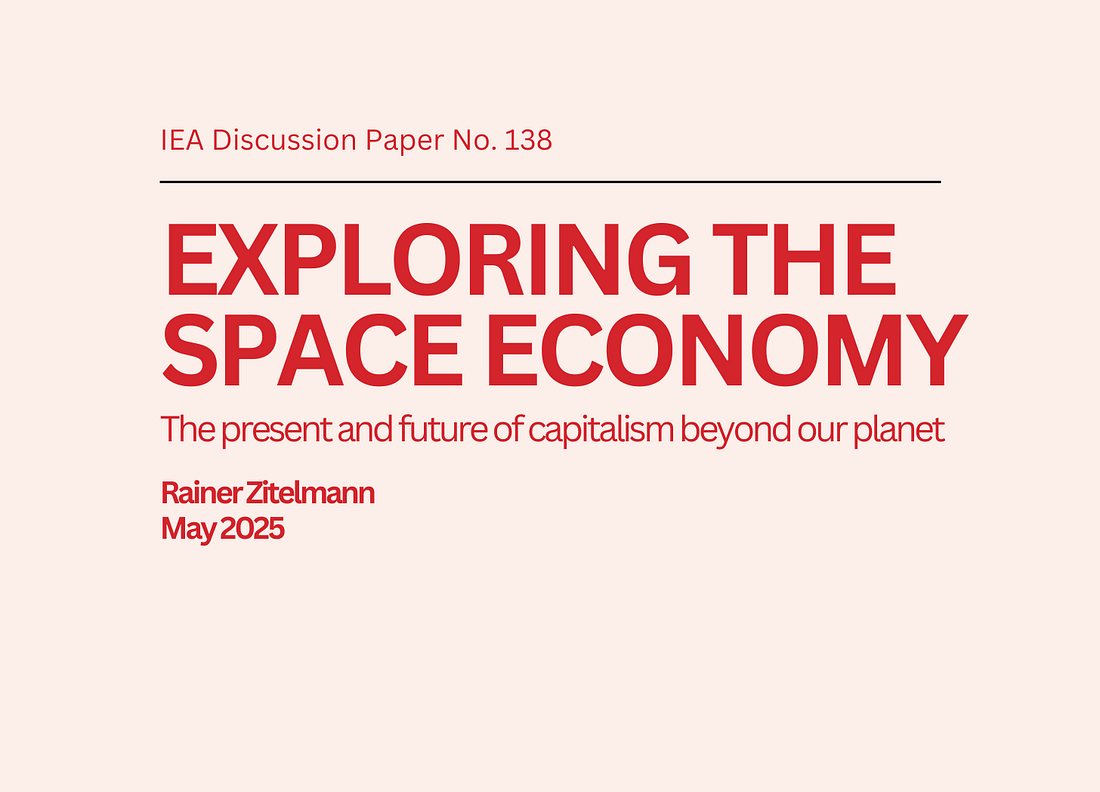|
New space race between the US and China already started, and Governments should embrace private enterprise.
Private companies, such as Elon Musk’s SpaceX, now account for 82% of space industry revenues, with government and military sectors making up the remainder.
Regulatory and bureaucratic obstacles remain the biggest threat to further expansion.
A more liberalised policy framework is paramount to competing with China.
A new review of literature on the space economy, published by the Institute of Economic Affairs (IEA), highlights the rapid expansion of private enterprise in space exploration and its potential to outpace traditional government-led initiatives.
"Exploring the Space Economy", by Dr. Rainer Zitelmann, outlines how market-driven innovation is lowering costs, accelerating technological breakthroughs, and making space more accessible than ever before. With estimates suggesting that the space industry could be worth $1.8 trillion by 2035, the report argues that regulatory barriers must be minimised to allow competition and entrepreneurship to flourish.
The second space race, between China and the United States, has already begun, but there are two key differences to the last space race. It now encompasses tangible economic and military interests. And above all, this time the private sector will determine the outcome.
To unlock the $1.8 trillion potential of the space economy and compete with China, we must dismantle existing regulatory barriers. When SpaceX submitted its launch application, the FAA received 18,000 public comments on the environmental impact. As argued by Dr Zitlemann, “opponents of progress understand they can ‘paper’ a project to death in America, but regulatory delays and public concerns will not delay China’s Starship clone.”
Private investment has already revolutionised satellite technology and launch services, with companies like SpaceX slashing costs by over 80%. The next frontier, asteroid mining, commercial space stations, and a lunar economy depends on a pro-market approach free from excessive government interference.
The paper also examines the geopolitical implications of the new space race. While China and the U.S. compete for dominance, the real drivers of progress are private firms seeking commercial opportunities beyond Earth.
Zitelmann notes that the space economy stands as perhaps the only sector where the private sector has bucked recent international trends, stepping into a crucial role previously dominated by governments and military bodies.
Privately driven space exploration is not just a recent phenomenon. The paper points out how private businesses and individuals drove and funded observatories in the early twentieth century, so recent developments in space are as much a reversion to the original approach.
Companies in the space economy have consistently delivered extraordinary scientific advancements and pioneering innovations. By fostering an environment of market-driven innovation, these companies have not only reduced costs but have also accelerated the pace of technological progress, making space more accessible than ever before.
Rainer Zitelmann, report author and historian, said:
"Private enterprise has transformed space exploration, driving innovation and slashing costs where governments once dominated. To unlock the $1.8 trillion potential of the space economy by 2035, we must dismantle regulatory barriers and let competition soar.
“Manned space flight has stagnated for decades since the end of the Apollo program because politicians interfere too much. Projects such as the Space Shuttle and the ISS saw costs explode, and these were out of all proportion to the benefits. So-called ‘cost plus’ programs created completely wrong economic incentives. With Government space programs, we haven't made it to Mars in the last 50 years and wouldn't get there in the next 50 years either. The only hope lies in private space travel."
You’re currently a free subscriber to Insider. For the full experience, upgrade your subscription.
Paid subscribers support the IEA's charitable mission and receive special invites to exclusive events, including the thought-provoking IEA Book Club.
We are offering all new subscribers a special offer. For a limited time only, you will receive 15% off and a complimentary copy of Dr Stephen Davies’ latest book, Apocalypse Next: The Economics of Global Catastrophic Risks.
